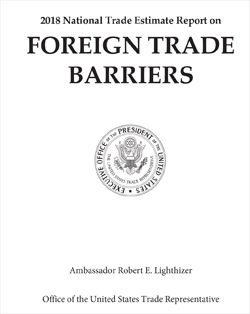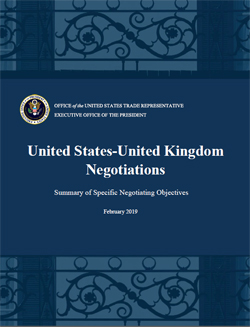US Demands Chlorinated Chicken And Anti-biotics In Meat Are Part Of UK/US Trade Deal
The Prime Minister stated that the FSA should give chlorine-washed chicken the go-ahead - Daily Express
The biggest threat to food safety and to our farmers is not so much our leaving the EU, but a future desperation for a UK/US Trade Agreement, which was never ever mentioned in all the debates over Brexit.
Unionsafety has sought to emphasise this aspect of the future for our food safety if and when a trade agreement with the US is concluded that necessitates the abolition of maintaining EU food safety and animal welfare standards.
The relevant documentation on this subject is available to download from the E-Library hosted by this website.
Cheap American farming produce in the forms of anti-biotic and growth hormone stuffed meat and chlorinated chicken is the keystone of the US trade policy as it aims to be able to bombard the UK food market with produce which is not only dangerous to our health, but is also farmed in the most brutal and inhumane manner.
Cattle are kept inside in concrete pens in many of the factory farming establishments of the US, whilst poultry is kept in a similar manner. But the question of the conditions in which these animals live and the manner of their being despatched before dissection and being turned into meat, ensures that in an effort to protect the American public from food poisoning, Chlorine baths are used to wash the poultry in before being packaged for the supermarkets.
Following the general election, during which the Tories in the form of Boris Johnson claimed no such thing would happen and that chlorinated chicken will never be accepted as part of any trade deal with the US and indeed has repeatedly promised not to weaken food standards as part of a trade deal with the US.
Further, environment secretary Theresa Villiers saying that the UK would "not be importing chlorinated chicken" just weeks ago, as it became clear that UK farmers also fear it would force them to slash their standards, in order to compete, jeopardising sales in their main market of the EU – which outlaws chlorine-washed chicken and hormone-pumped beef.
But, as expected, Boris Johnson has reneged on this statement and now say that our Food Standards Agency should approve chlorinated chicken!
But the row has heated up with US ambassador Woody Johnson writing to The Sunday Times insisting that the modified meat and poultry should be accepted by Britain. A stance further endorsed by the visit of US State Secretary Mike Pompeo visit to meet with Johnson this week.
Woody Johnson wrote in the Sunday Times:
"These products should absolutely be included in a US-UK free trade agreement that will create new markets for farmers from both countries and offer more choices to British and American consumers." he said, calling on the UK food standards agency to "recommend" the products.
He continued:
"When it comes to anti-microbial washes, the European Food Safety Authority agrees they are the most effective and economical way to fight food-borne illness, campylobacter in particular. This is the most common cause of food poisoning in the UK and most Britons contract it from contaminated chicken.”
Yet this statement is not borne out by the evidence.
The fact is that improperly stored and cooked meat and fish is the main course of food poisoning in the UK, and the lack of good hygiene when preparing food, according to both the FSA and the NHS.
A House of Lords report in 2017 warned that "the greatest threat" to welfare standards would be "UK farmers competing against cheap, imported food from countries that produce to lower standards than the UK".
"The government's wish for the UK to become a global leader in free trade is not necessarily compatible with its desire to maintain high animal welfare standards," the House of Lords subcommittee on EU Energy and Environment found.
 This week, during his visit to the UK, the US secretary of state Mike Pompeo, insisted that the biggest barrier to any future trade deal with his country was the question of agriculture and US farmer’s produce. Claiming that it would make for a “really good deal”, he stated that Washington will demand the inclusion of its controversial agricultural products, despite Boris Johnson insisting he will not let them in if they lower standards.
This week, during his visit to the UK, the US secretary of state Mike Pompeo, insisted that the biggest barrier to any future trade deal with his country was the question of agriculture and US farmer’s produce. Claiming that it would make for a “really good deal”, he stated that Washington will demand the inclusion of its controversial agricultural products, despite Boris Johnson insisting he will not let them in if they lower standards.
In a manner not dissimilar to that of climate change deniers such as he and Trump, by denying the science and claiming it is a trade barrier; Pompeo agreed the issue would be “real contentious” – but warned US farmers would demand it to be part of any trade deal.
“Our ask will be as it has been in the other negotiations,” he said. “We need to be open and honest about competitiveness. We need to make sure we don't use food safety as a ruse to try and protect a particular industry.”
Whilst UK Government ministers have repeatedly insisted they will not allow their supposed prize of a US-UK trade deal to lower food standards in the search for cheaper food, promised by Brexit supporters.
But it is not just meat and poultry that has significant risks to food safety and our health, US producers are allowed to include up to 30 insect fragments in a 100g of peanut butter, and the US has made it clear it ‘concerns’ for trade because of the EU’s current protection for food safety and animal welfare standards. Again these are seen as barriers to trade.
The Independent has this report on the issue of contaminates allowed in food produced in the US:
Insect-filled chocolates, rat hair-infested noodles, and orange juice containing maggots are just some of the “horrors” UK consumers could be forced to accept if post-Brexit Britain signs a wide-ranging trade deal with the USA.
 In the US, producers adhere to a “Defects Levels Handbook,” which sets out the maximum number of foreign bodies like maggots, insect fragments and mould that can be in food products before they are put on the market.
In the US, producers adhere to a “Defects Levels Handbook,” which sets out the maximum number of foreign bodies like maggots, insect fragments and mould that can be in food products before they are put on the market.
For example, US producers are allowed to include up to 30 insect fragments in a 100g jar of peanut butter; as well as 11 rodent hairs in a 25g container of paprika; or 3mg of mammalian excreta (typically rat or mouse excrement) per each pound of ginger.
In the EU there are no allowable limits for foreign bodies in food products.
MPs told Business Insider they are worried that a UK-US trade deal designed by Brexiteers could open the floodgates to contaminated food.
“Clearly, The Tories have some very unpleasant surprises for UK dinner tables if they have their way with a fast-track trade deal with the United States,” Bill Esterson, the shadow trade minister, said.
“We know the Tories are keen on chlorine-washed chicken and hormone-fed beef but they surely cannot expect that the British public will be happy to swallow these other horrors.”
But where is the evidence that a hard line position will be adopted once negotiations start?
Unionsafety, back in 2018 highlighted a 500 page document from the US Trade Representative entitled Foreign Trade Barriers which details US Government objections to standards based on scientific evidence and concerning food safety; which it wants removing before making any trade deals with other Governments.
Further, there was the 2019 document entitled United States-United Kingdom Negotiations Summary of Specific Negotiating Objectives, which again, Unionsafety made available from its E-Library.
Both documents remain available to download here, using the search term ‘brexit’.
Source: The Indepentent / The New European / Sunday Times / Express

